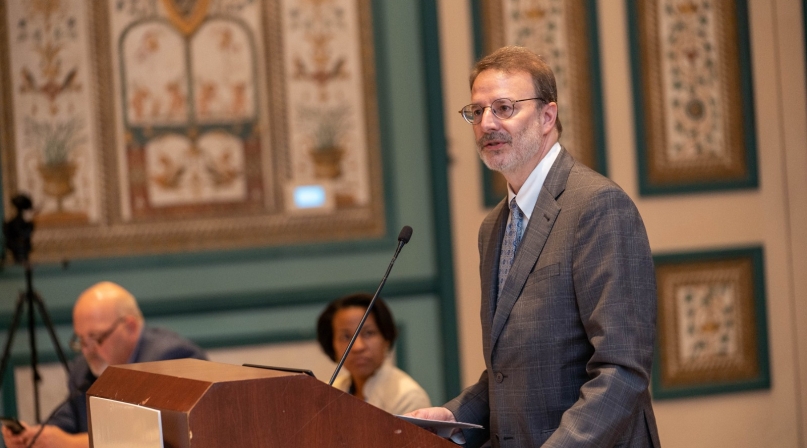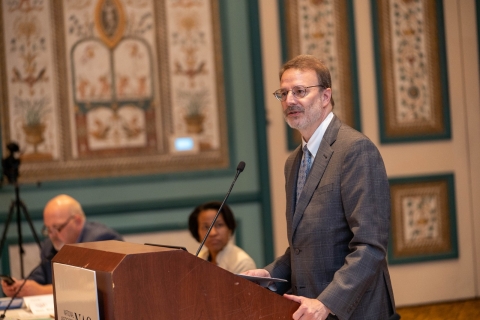County officials talk opportunity zones, EDA, partnerships
Author
Upcoming Events
Related News

Key Takeaways
National policy experts discussed economic and workforce development issues with a full room of county officials at the Community, Economic and Workforce Development Policy Steering Committee business meeting.
The meeting began with a discussion on opportunity zones.
Larry Jackson, program advisor to the assistant secretary at the Office of Community Planning and Development at the U.S. Department of Housing and Urban Development, defined opportunity zones as economically distressed census tracts.
He explained that HUD’s role is to leverage resources and support local areas to revitalize communities.
Deputy Assistant Secretary for Regional Affairs with the Economic Development Administration (EDA) at the U.S. Department of Commerce Dennis Alvord added that opportunity zones were created to stimulate economic development and job creation by incentivizing long-term investments in low-income neighborhoods.
He explained how opportunity zones are economically distressed communities where private investments may be eligible for capital gain incentives under certain conditions.
“Opportunity zones as we all know are poverty stricken, hard crime, lack of quality education, lack of quality food, lack of quality healthcare,” said Scott Turner, executive director of the White House Opportunity and Revitalization Council.
According to Turner, there are 8,761 opportunity zones around the country, in both rural and urban communities.
“Many people think that poverty is in the urban areas of America, but poverty has no favorites,” he said.
Turner received a standing ovation after telling county officials “this is the time, today is the day” to work to revitalize communities.
County officials then transitioned to discuss the impacts of automation and workforce development.
Senior Director of Global Public Policy at Walmart Angie Cooper discussed modernizing existing laws to revamp policy actions.
She discussed how Walmart has found a major skills gaps and recently released a report that served to start a conversation about the future of the workforce.
“There are so many people doing great work all across the country and we want to ensure because of where we sit, what we see, our customer base… We want to be at that table,” she said.
Other partners that work with the Community, Economic and Workforce Development Committee shared updates on advancing policy on the federal level.
Katia Albanese, a project director for several U.S. Department of Labor Office of Disability Employment Policy initiatives including the State Exchange on Employment and Disability, discussed unemployment and disability.
According to Albanese, 1 in 10 working-age Americans has a disability that impacts their opportunity to work.
She advised county officials to raise awareness and elevate the importance of diversity and accessibility in hiring practices to help those who are disabled in the workforce.
“A strong national economy requires strong local economies, and an inclusive national workforce requires strong local workforces and that means workforces where everyone who wants to work, does work,” she said.
Mitchell Glasser, manager of the Housing and Community Development Division in Orange County, Fla., and president of the National Association for County Community and Economic Development (NACCE), represented NACCE as a partner for county officials.
Ted Stiger, senior director of Government Relations with the Rural Community Assistance Partnership brought the conversation full circle by discussing how the EDA can help local officials from a policy perspective.
“We cannot forget about the important role that EDA plays, the public works program, the planning program, how counties are involved in that,” he said.

Attachments
Related News

ERC fellows demonstrate value of relationships in economic development
Traditional economic development schools of thought do not typically recognize relationships as assets that a community can use to further their economic development agenda, but Economic Recovery Corps fellows feel otherwise.

Congress Passes Landmark Outdoor Recreation Package
Lawmakers passed the bipartisan EXPLORE Act (H.R.6492) on December 19 to boost outdoor recreation opportunities on public lands for county residents and visitors and aid gateway communities

